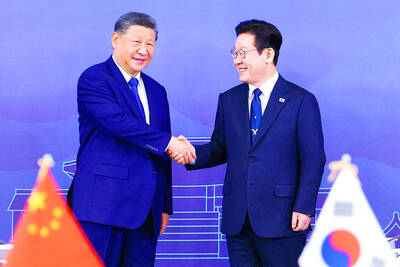Throttled by censorship, Nepal's newspapers have found a new way to get their message across to their readers -- cartoons.
Tough media censorship has been in place in Nepal since King Gyanendra took power on Feb. 1, declaring a state of emergency.
Military censors now watch over the publication of news reports, several journalists have been detained, and several newspapers in villages and smaller towns have been shut down.
But cartoonist Rajesh KC -- he uses initials for his last name -- is among a handful of cartoonists trying to illustrate with sketches what cannot be said in words. He works for the country's largest newspaper, Kantipur.
One recent cartoon showed three top leaders -- under house arrest for weeks, and unable to get haircuts -- trying to find a barber to trim their increasingly long hair.
Another showed family members jumping to grab the telephone when a bicycle bell rings outside -- an allusion to the snapping of telephone and Internet links for a week after the royal takeover.
The topics may not sound contentious but reporters have to avoid them.
"We have been able to do what journalists have been barred from doing. Our role has become much more important now and we owe it to our readers to get the messages to them," KC said.
"I have had to draw a line that I cannot cross. However, with every cartoon I feel I am getting bolder," he said.
The one issue he avoids is Nepal's security forces, which can be particularly sensitive to criticism. Army officials have warned him, he said, against drawing cartoons that would "hamper the morale."
Besides making fun of the government and illustrating its activities, the cartoonists also portrayed the difficulties faced by common people due to the recent blockade of highways by the Maoist rebels.
In the Katmandu newspaper Rajdhani, one recent cartoon showed a politician giving a speech inside his bedroom because public speeches are now banned, with another showing detained political leaders asking a soldier if they are allowed to give speeches in jail.
The cartoonists' work resonates strongly with readers.
"These days it seems the only ones who are brave enough to express [opinions] in newspapers are the cartoonists," said Prem Sharma, a court clerk.
In the early days of the takeover, soldiers were stationed in all the newspaper offices, deleting any material they thought was critical of the king or the government. The government later issued a directive to media companies saying they could not publish or broadcast anything against the king, the royal government and the security forces.
Cartoonists are the only ones who have not complied. One cartoon showed a journalist faxing his story and a government censor hiding under the table, reading the story as it is fed through the machine.
Another portrayed a father scolding his son for cutting apart the newspaper, with his wife explaining it was not the child's fault -- the newspaper itself had shrunk.

‘CHILD PORNOGRAPHY’: The doll on Shein’s Web site measure about 80cm in height, and it was holding a teddy bear in a photo published by a daily newspaper France’s anti-fraud unit on Saturday said it had reported Asian e-commerce giant Shein (希音) for selling what it described as “sex dolls with a childlike appearance.” The French Directorate General for Competition, Consumer Affairs and Fraud Control (DGCCRF) said in a statement that the “description and categorization” of the items on Shein’s Web site “make it difficult to doubt the child pornography nature of the content.” Shortly after the statement, Shein announced that the dolls in question had been withdrawn from its platform and that it had launched an internal inquiry. On its Web site, Le Parisien daily published a

China’s Shenzhou-20 crewed spacecraft has delayed its return mission to Earth after the vessel was possibly hit by tiny bits of space debris, the country’s human spaceflight agency said yesterday, an unusual situation that could disrupt the operation of the country’s space station Tiangong. An impact analysis and risk assessment are underway, the China Manned Space Agency (CMSA) said in a statement, without providing a new schedule for the return mission, which was originally set to land in northern China yesterday. The delay highlights the danger to space travel posed by increasing amounts of debris, such as discarded launch vehicles or vessel

RUBBER STAMP? The latest legislative session was the most productive in the number of bills passed, but critics attributed it to a lack of dissenting voices On their last day at work, Hong Kong’s lawmakers — the first batch chosen under Beijing’s mantra of “patriots administering Hong Kong” — posed for group pictures, celebrating a job well done after four years of opposition-free politics. However, despite their smiles, about one-third of the Legislative Council will not seek another term in next month’s election, with the self-described non-establishment figure Tik Chi-yuen (狄志遠) being among those bowing out. “It used to be that [the legislature] had the benefit of free expression... Now it is more uniform. There are multiple voices, but they are not diverse enough,” Tik said, comparing it

RELATIONS: Cultural spats, such as China’s claims over the origins of kimchi, have soured public opinion in South Korea against Beijing over the past few years Chinese President Xi Jinping (習近平) yesterday met South Korean counterpart Lee Jae-myung, after taking center stage at an Asian summit in the wake of US President Donald Trump’s departure. The talks on the sidelines of the APEC gathering came the final day of Xi’s first trip to South Korea in more than a decade, and a day after his meeting with the Canadian prime minister that was a reset of the nations’ damaged ties. Trump had flown to South Korea for the summit, but promptly jetted home on Thursday after sealing a trade war pause with Xi, with the two